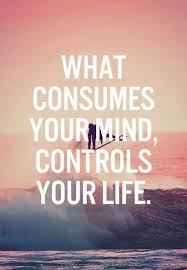How your distorted thoughts could be affecting your relationships—Part II

By Maggie Dulcio, LMHC, CAP
In my last post I introduced the impact of our distorted thinking on our relationships. So this time around, I would like to horn in on the eight limited thinking patterns previously presented. I will introduce four of the eight in this post and will continue with the other four next time. Let me start with a short story. I had a client once who had been studying and working hard to pass the state teaching certification exam. She took the test several times and could not pass it. Her co-workers were very well aware of her situation and felt terrible for her. She finally took the test and passed it after her fifth attempt. That day when she took the exam, she got the results immediately. She was so elated she called one of her colleagues, Cindy whom she was closest to and shared the good news. The test was given on a Saturday and during the weekend, while Cindy was at the gym she saw another co-worker, Laura. In her excitement, Cindy shared the news with Laura. When my client got to her job on Monday, Laura came to her and congratulated her on the passing of the exam. My client was livid that her colleague had informed others that she had passed the exam. She felt that she, the client should have been the one tell anyone and that her colleague, Cindy, should have known not to tell others. My client went to Cindy, in a not so pleasant way, and expressed how she felt about what the situation. Cindy was completely stunned by my client’s reaction. I think this is a great example of the shouldsdistorted thinking.
Let me introduce you to the eight characters of our distorted thoughts
1 Filtering We focus on the negative details while ignoring all the positive aspects of a situation.
Filtering Fiona has a seven-year-old son. He is constantly getting into trouble, at school his grades are poor because he is not putting any effort in completing his work and his teacher is constantly requesting for a parent-teacher conference. Filtering Fiona is asked to come to the school for a meeting with the teacher. When she gets there, the teacher tells Filtering Fiona that she is continuing to have problems with her son. The teacher recommends that Filtering Fiona get some tutoring to help the seven-year-old with schoolwork because he seems to be struggling with some of the materials. The teacher also informed Filtering Fiona the son entered an art contest at school and he won first place and will be moving on to the regional competitions. The teacher indicates that the son is very artistic and may need to find some ways of channeling his talent and this may possibly be way to motivate her son. During the entire meeting all that Filtering Fiona could think about is that she is sitting in another parent-teacher conference because her son is not doing well in school and “why can’t my son be like the other children"?
Have you ever met anyone who only focuses on the negative? Can you imagine having to constantly deal with that person? They are unable to see the brighter side of things. They complain about everything and do not believe things can ever get better. This can really impact how that person interacts with others.
2 Polarized Thinking Things are black or white, good or bad. We have to be perfect or we are a failure. There is no middle ground, no room for mistakes.
Polarized Thinking Pete, grew up being told that in order to be successful you need a college degree. He truly believes “it is your degree that is going to land that dream job” as he was told growing up. Polarized Thinking Pete had to drop out of school his second year of college before he could earn his Associate Degree because his parents had an accident and he had to help out the family. His goal is to go back to school one day and complete his degree. He is currently having some issues in his current relationship. Polarized Thinking Pete is considering ending his relationship with Sue. They have been together for two years. Polarized Thinking Pete thinks that Sue should go to school to complete her bachelor’s degree. Sue has been at her job for the last four years and likes her job. She’s expecting to get a promotion and would like to eventually move up the ladder and manage her department. Sue believes she can do this without a college degree. Polarized thinking Pete believes that in order for Sue to succeed she would need to get her Bachelor’s degree. This has caused a lot of strife in the relationship. Polarized Thinking Pete believes that education equates to success and that the only way to ensure success is to have a degree. Sue is a hard worker and she loves her job and believes her hard work is going to ensure her success. Other than this issue, the couple is quite compatible and they truly enjoy spending time with each other. However, Polarized Thinking Pete does not believe that the relationship can work if Sue is unwilling to go back to school and earn her degree.
With this pattern of thinking there is no middle ground. When dealing with someone with that thinking pattern it’s hard to find a compromise. The person only sees things as either or with no gray area.
3 Overgeneralization We reach a general conclusion based on a single incident or piece of evidence. We exaggerate the frequency of problems and use negative global labels.
Overgeneralization Opal met Michael about a month ago and they seem to hit it off right from the start. They have been talking on the phone nightly. They’ve discovered that they have many things in common and similar interests. After talking for about a month, Opal finally summed up the courage to ask Michael on a date and Michael gladly accepted. They decided on dinner and a movies for their first date. Shortly after they arranged the date, Michael’s work got very busy and he had to work late so, he was not able to talk on the phone with Opal like they had been doing. Unfortunately, the night before their date Michael got a call from his parents asking him to come home to help them deal with his younger sister. Unfortunately, Michael had to call and cancel the date. Overgeneralization Opal does not take the news well. She thinks that Michael was turned off that she was the one who asked him on a date and got cold feet so he decided to cancel the date. Overgeneralization Opal starts thinking about previous guys in her life who blew her off and believes this is happening to her once again. When Michael gets back in town and calls Overgeneralization Opal, she gives him the cold shoulder.
This is the person who tends to use superlatives when dealing with his/her situations. They will judge a situation based on unfounded beliefs.
4 Mind Reading Without their saying so, we know what people are feeling and why they act the way they do. In particular, we have certain knowledge of how people think and feel about us.
Mind Reading Mindy is taking a Sociology class at the local college. She speaks openly about her faith and on the first day of the class she had a heated debate about her religious views with the professor. She now believes that her professor does not like her due to her views. The professor has assigned a group project and selected the individuals in each group. Mind Reading Mindy believes that the professor has put her in a group with people she does not get along with and that they are not as motivated as she is and the professor did that because he does not like her. Mind Reading Mindy also believes that she has been graded unfairly on a few of the assignments for the same reason. She believes that this all started from the beginning of the semester when she expressed her religious beliefs in class. Interestingly Mind Reading Mindy does not know that the professor is of the same faith as she is, he no ill feelings towards her and actually enjoys having Mind Reading Mindy in his class.
This can be a challenge because as humans, we want to get a read on people as this can be useful in protecting ourselves from harm. This becomes a problem when we automatically believe that our distorted thoughts are accurate without clear evidence.


